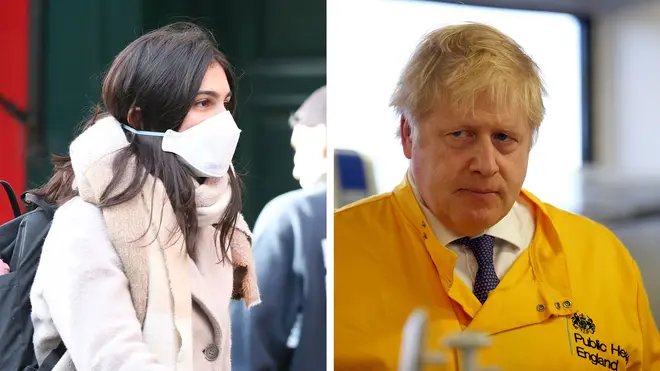
Nick Abbot 10pm - 1am
12 March 2020, 07:36 | Updated: 7 June 2023, 08:56
Boris Johnson is expected to move Britain into a new phase of tackling coronavirus after the World Health Organisation declared a global pandemic. So how will that affect your life?
Officials have been trying to delay the spread of coronavirus, rather than simply contain it, in the hope of moving the peak of cases away from the winter pressures on the NHS.
The government's plan is in four stages - Containment, Delay, Research and Mitigate.
So as we move to the delay phase, what does that involve and how will it affect your life? LBC looks at what will happen next.
Phase two of the coronavirus battle plan is to delay the peak of the virus until the summer.
The reason that the government want to delay the spike in diagnoses is to ease the pressure on the NHS, which is always under severe pressure in the winter months.
Viruses are also less contagious during the summer months, so it is hoped that coronavirus will not spread as easily by then.
READ MORE: Coronavirus myths busted by experts
READ MORE: Do anti-bacterial hand gels stop coronavirus?

The official Public Health England document on the battle plan states that many of the same things we are currently being told to do continue to be important: washing your hands more regularly, catch coughs and sneezes in tissues and throw them away and avoid touching your face.
However, it also says that other social distancing techniques may be necessary to limit the spread of the virus.
It states: "Our experts are considering what other actions will be most effective in slowing the spread of the virus in the UK, as more information about it emerges.
"Some of these will have social costs where the benefit of doing them to Delay the peak will need to be considered against the social impact."
The options the government are considering include:
- Encouraging employees to work from home where possible
- Closing schools to stop the spread of the virus
- Stopping large gatherings of people, such as sporting events and conferences
The Times reports that a plan is in place to play all Premier League and Football League matches behind closed doors, streaming the matches online.
So far there have been many confirmed cases where schools have closed to prevent further spreading of COVID-19.
Some of the previously confirmed cases are:
Dublin - A secondary school closed for 14 days following a student’s return from an infected area in Italy. He’s being monitored in Dublin’s hospital with infection-control measures.
Tetbury, Gloucestershire - Closed for three days after a staff member tested positive.
Cransley School in Northwich, Cheshire - School closed for the a few days following a ski trip to Italy.
Trinity Catholic College in Middlesbrough - Pupils infected here were also the result of an Italy ski trip.
Churston Ferrers Grammar School in Brixham, Devon - Reports suggest they've closed over a suspected coronavirus case.
Tamworth, Stoke-On-Trent - closed after a staff member tested positive.
Woodlands School in Whitleigh, Plymouth - closed for a deep clean after a member of staff "potentially" came into contact with an individual who is being tested for Covid-19.
It's advised to keep check on your school's websites for further closures.
All schools in Ireland have closed until March 31st to help prevent any further spread of coronavirus.
Italy, the European country where the outbreak has been the worst, has put the entire country in lockdown. There are curfew in place in the evening, everyone has been asked to remain 3-foot away from each other and large gatherings have been banned.
Schools have been closed in a number of countries around the world, including Ireland, Japan Norway and Denmark. While children rarely show any symptoms from coronavirus, they can act as spreaders and that can lead to infections of adults.
In China, cities were placed in lockdown, with people being unable to enter or leave. Some reports even suggested that people were welded into their homes.
Sporting events have been heavily affected. Serie A in Italy and La Liga in Spain have been suspended for a couple of weeks, while other games have been played behind closed door.
In tennis, the ATP has announced a six-week suspension of the men's professional tour, due to "escalating health and safety issues" arising from the coronavirus outbreak.